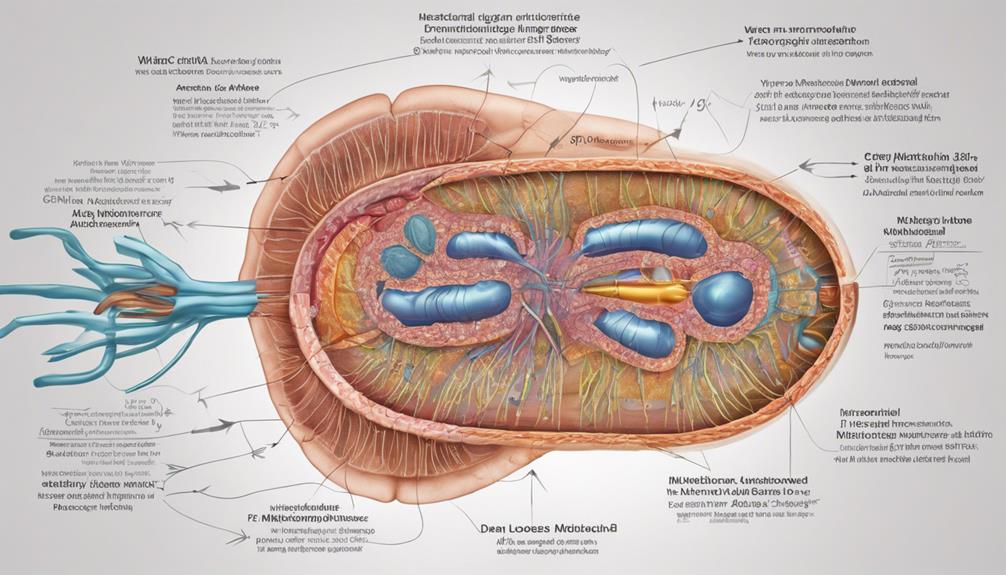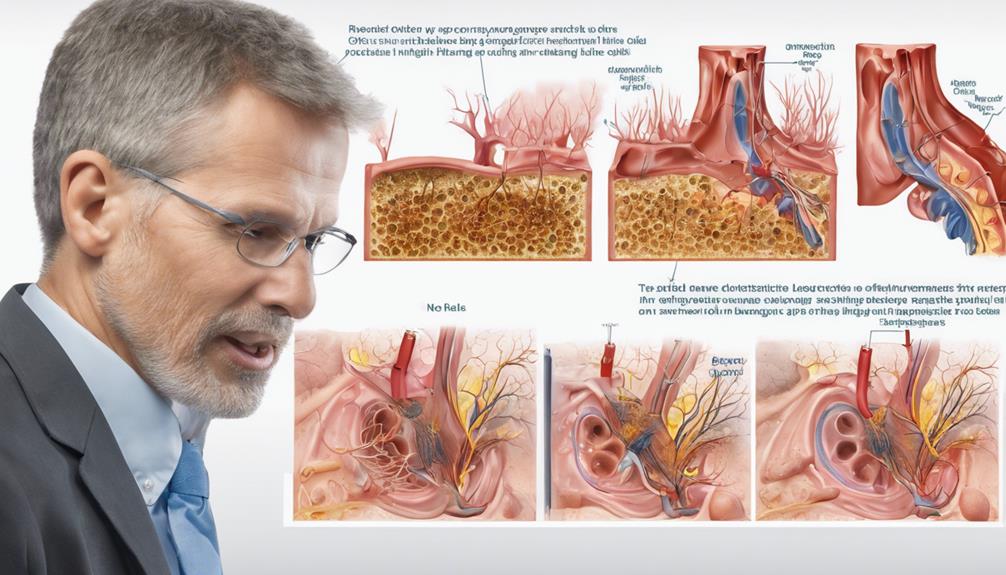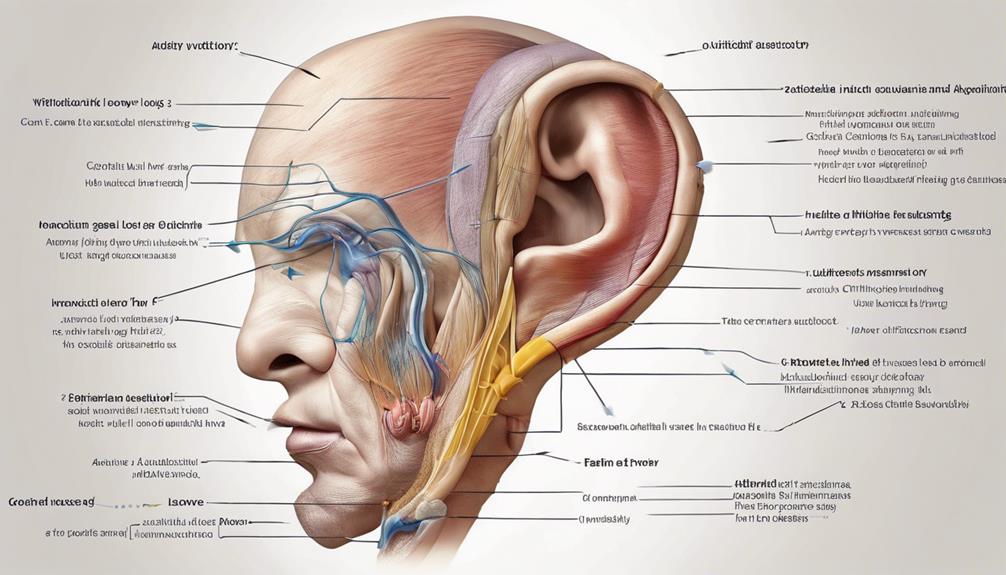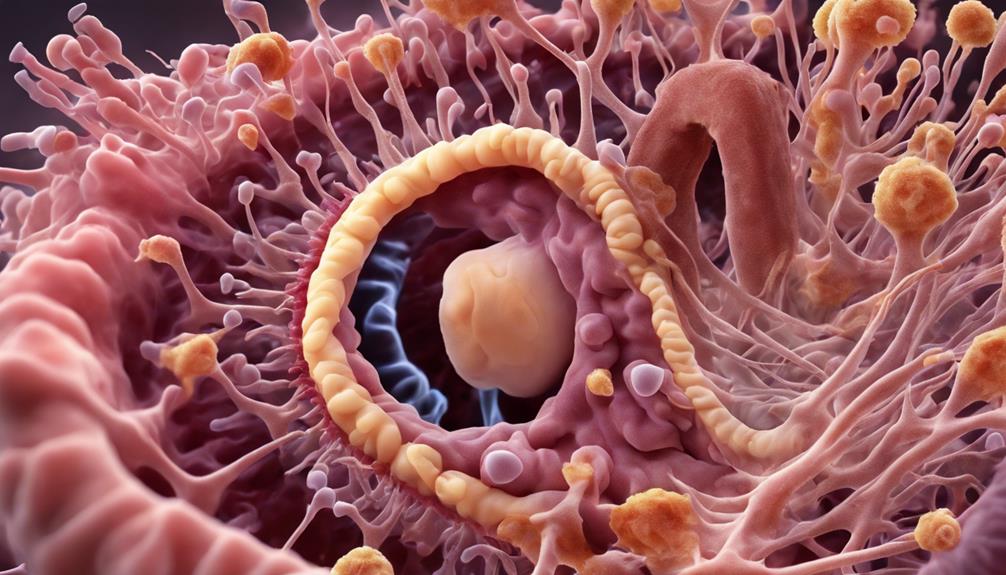As we delve into the intricate paths of hearing loss caused by gentamicin, a clearer comprehension emerges about the concealed dangers linked to this commonly used antibiotic.
The gradual unraveling of how this medication can harm our auditory senses sheds light on the cautionary tale it conceals.
By dissecting the intricate dance between gentamicin and our delicate cochlear mechanisms, we begin to grasp the intricate web of factors at play.
Join us on this journey as we unveil the hidden intricacies of gentamicin's impact on our ability to perceive sound, a narrative that holds crucial implications for both patients and healthcare providers alike.
Key Takeaways
- Gentamicin disrupts inner ear hair cells, leading to permanent sensorineural hearing loss.
- Mitochondrial DNA mutations can exacerbate gentamicin-induced hearing loss.
- NMDA receptors and glutamate play key roles in gentamicin-induced ototoxicity.
- Reactive oxygen species instigate oxidative stress in the inner ear, harming hair cells.
Mechanism of Gentamicin Ototoxicity
Gentamicin enters inner ear hair cells, disrupting cellular function and causing permanent hearing loss, a process known as gentamicin ototoxicity. This drug-induced damage primarily affects the sensory cells within the inner ear, leading to sensorineural hearing loss. By interfering with the delicate mechanisms of these hair cells, gentamicin can result in auditory nerve damage, impairing the transmission of sound signals to the brain.
Research has demonstrated that the toxic effects of gentamicin on hearing are dose-dependent, meaning that higher cumulative doses pose a greater risk of ototoxicity. Monitoring for signs of aminoglycoside-induced hearing loss is crucial in clinical practice to prevent irreversible damage. Understanding the cellular disruption caused by gentamicin is essential for healthcare professionals to identify early indicators of inner ear toxicity and intervene before significant hearing loss occurs.
In essence, the ototoxic effects of gentamicin highlight the importance of vigilance in managing patients receiving this medication to minimize the cumulative dose risk and preserve auditory function.
Mitochondrial DNA Mutations and Gentamicin

Mitochondrial DNA mutations can significantly impact susceptibility to aminoglycoside-induced hearing loss. When exposed to gentamicin, these mutations can exacerbate ototoxicity by interfering with mitochondrial RNA, causing mistranslation and subsequent cell damage.
The altered structure and function of cells due to mitochondrial mutations contribute to the pathogenesis of aminoglycoside-induced hearing loss. This connection underscores the importance of understanding how mitochondrial DNA mutations affect the susceptibility to gentamicin-related ototoxicity.
NMDA Involvement in Ototoxicity
Involvement of NMDA receptors in aminoglycoside-induced ototoxicity highlights the role of excitotoxicity in causing cell damage within the inner ear. Glutamate, a key excitatory neurotransmitter, activates NMDA receptors, leading to an influx of calcium ions and subsequent cell damage. The overstimulation of NMDA receptors by aminoglycosides can initiate cell death in the cochlea, ultimately contributing to hearing loss. Experimental studies have shown promise in mitigating aminoglycoside-induced cochlear damage by blocking NMDA receptors. Understanding the intricate NMDA pathway in ototoxicity is crucial for developing targeted interventions aimed at safeguarding against drug-induced hearing loss.
| NMDA Involvement in Ototoxicity | |
|---|---|
| Key Players | NMDA receptors, Glutamate |
| Mechanism | Calcium influx, Cell damage |
| Site of Action | Inner ear, Cochlea |
| Importance | Drug-induced hearing loss, Targeted interventions |
Role of ROS in Ototoxicity

Reactive oxygen species (ROS) are pivotal in the development of aminoglycoside-induced ototoxicity, instigating oxidative stress within the inner ear. When ROS levels increase, they inflict harm on the delicate hair cells present in the cochlea, directly contributing to the progression of aminoglycoside-related hearing impairments.
Moreover, the heightened presence of ROS can set off a cascade of events leading to apoptosis, the programmed cell death, particularly affecting the sensory cells within the inner ear. To combat the detrimental effects of ROS, antioxidants play a crucial role in mitigating the damage caused by oxidative stress and hold promise in shielding against aminoglycoside-induced ototoxicity.
Understanding the intricate involvement of ROS in ototoxicity not only sheds light on the mechanisms underlying hearing loss but also paves the way for the development of targeted therapies aimed at preventing or minimizing the adverse consequences of aminoglycoside exposure on auditory function.
Preventing Gentamicin-Induced Ototoxicity
To prevent gentamicin-induced ototoxicity, understanding the risk factors and implementing proactive measures is essential in safeguarding auditory health. Gentamicin primarily affects the hair cells in the inner ear, causing irreversible damage and potential hearing loss.
Healthcare professionals and patients must be educated about the ototoxic effects of gentamicin to prevent hearing damage. Regular monitoring of hearing function and serum gentamicin levels can help in early detection of ototoxicity, potentially preventing severe hearing loss.
Research is actively seeking alternative medications with lower ototoxic effects to reduce the risk of gentamicin-induced hearing loss. Furthermore, innovative technologies and interventions are under exploration to mitigate and manage gentamicin-induced ototoxicity, ultimately improving outcomes for individuals at risk.
Frequently Asked Questions
How Does Gentamicin Cause Hearing Loss?
Gentamicin causes hearing loss by damaging the delicate hair cells in the inner ear, particularly the cochlea. This damage leads to irreversible hearing impairment, as it disrupts the transmission of sound signals to the brain.
Even at regular doses, this drug can induce ototoxicity. Monitoring serum levels and promptly detecting changes in hearing are crucial for managing gentamicin-induced hearing loss.
It's essential to prioritize the health of our ears when using this medication.
How Do Aminoglycosides Cause Hearing Loss?
Aminoglycosides, like gentamicin, cause hearing loss by damaging the delicate hair cells in the ear. These drugs, including over 100 ototoxic medications, are potent against certain infections but can harm hearing.
Aminoglycosides, composed of amino sugars and aminocyclitol, are particularly harmful due to their specific ototoxic mechanism. This damage can significantly impact an individual's quality of life, leading to hearing impairment and balance problems.
What Is the Most Common Way Gentamicin Ototoxicity Presents?
When facing gentamicin ototoxicity, the most prevalent presentation involves bilateral vestibulotoxicity, impacting the inner ear's equilibrium system.
Symptoms like imbalance, oscillopsia, and vertigo can manifest due to gentamicin-induced vestibular harm.
This toxicity isn't dose-dependent, posing a risk throughout treatment.
Early detection and intervention are critical since severe bilateral vestibular loss may be irreversible.
Ceasing gentamicin promptly could aid in partial recovery from vestibular ototoxicity.
How Do Antibiotics Cause Hearing Loss?
Antibiotics, like gentamicin, cause hearing loss by damaging inner ear hair cells, leading to permanent impairment. Aminoglycosides, such as gentamicin, are known for ototoxic effects on hearing and balance.
Gentamicin-induced hearing loss is concerning due to its irreversible damage to the ear's delicate structures. The mechanism involves disrupting hair cell function in the cochlea, impacting sound signal transmission to the brain.
Understanding this process is crucial for preventing and managing drug-induced hearing loss.
Conclusion
In conclusion, understanding how gentamicin can cause hearing loss is crucial for healthcare providers and patients alike.
By recognizing the mechanisms behind ototoxicity and implementing preventive measures, we can safeguard against potential harm.
Let's strive to protect our hearing with vigilance and care, as the impact of gentamicin-induced hearing loss can be as loud as a roaring lion in a quiet room.
Stay informed, stay cautious, and prioritize your auditory health.











